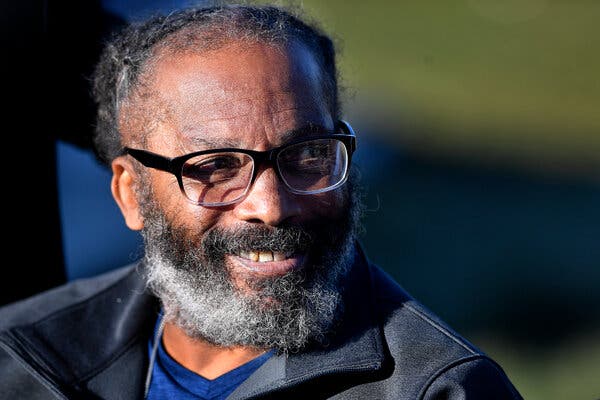After spending 43 years in prison for a crime he said he didn’t commit, a Missouri judge filed a motion to overturn Kevin Strickland’s conviction on Tuesday.
According to CNN, senior Judge James Welsh announced his ruling to release Strickland from custody immediately. The 62-year old spent four decades behind bars at the Western Missouri Correctional Center in Cameron, Missouri. He received a 50-year sentence without the possibility of parole after being convicted of one count of capital murder and two counts of second-degree murder in a triple homicide.
“The Court’s confidence in Strickland’s conviction is so undermined that it cannot stand,” the judge wrote. Strickland’s wrongful imprisonment for nearly 43 years is among the country’s longest.
Judge Walsh also stated that Jackson County Prosecutor Jean Peters Baker “met her burden of providing clear and convincing evidence that undermines the Court’s confidence in the judgment of conviction.”
“To say we’re extremely pleased and grateful is an understatement,” Baker said in a news release Tuesday. “This brings justice — finally — to a man who has tragically suffered so so greatly as a result of this wrongful conviction.”
Strickland, who uses a wheelchair, was greeted by reporters during his release from prison on Tuesday. He credits his legal team for showing great effort in having his case overturned, per CNN, KCUR.

“I didn’t think this day was going to come,” Strickland said. “I mean, not before I got this legal team, I didn’t.”
All criminal charges against Strickland were dismissed. The ruling comes two weeks after the defense and prosecution presented their closing arguments and witness testimony in Jackson County Circuit Court, according to KCUR.
“I was the easy mark, and the police took advantage of it,” Strickland said. “I really appreciate (Judge Welsh) taking his time to listen and understand what really happened in 1978.”
Sis2Sis previously reported that Strickland was granted a three-day evidentiary hearing from Nov. 8-10 after 17 failed attempts to overturn his case. As a result, Strickland was finally awarded his day in court to prove his innocence.
“Finally, somebody’s going to pay attention to my pleas of innocence,” he said, according to NBC affiliate KSHB. Strickland provided detailed testimony during the Nov. 8 evidentiary hearing in the case.
The 62-year-old was convicted in 1979 for a triple homicide in Kansas City, Missouri 1978. His first trial ended in a hung jury when the only black juror in the case, a woman, pushed for his acquittal. In the second trial in 1979, he was convicted by an all-white jury on one count of capital murder and two counts of second-degree murder.
Attorneys for Strickland and the Attorney General’s office stated during opening statements that the statements from Cynthia Douglas, a witness who survived the shootings, would be crucial to determine his innocence. However, before Douglas died in 2015, she recanted her story and identified Strickland as the shooter.
Strickland maintained his innocence while serving a life sentence. He said he was starting to lose faith in the criminal justice system during an interview with CBS news.
“There is nothing that they can do to make that right. My whole life is a memory of prison,” he said. “I don’t know anything else.”
During his release, Strickland said, “other inmates started hollering, and I heard them beating on walls and carrying on,” after he learned the judge’s decision during a breaking news update while watching soap operas.
The 62-year-old was greeted by his family and legal team outside of the Cameron, Missouri prison. When a reporter asked his following plans, he snickered and said he didn’t know.
“I think I’ve created some emotions that you all don’t know about just yet. … Happy, joy, sorrow, fear — I’m trying to figure out how to put them all together,” he said, “I’m not necessarily angry — it’s a lot.”
Strickland is the first inmate found innocent by the Jackson County prosecutor’s Conviction Review Unit, which works to prevent, identify, and fix false convictions, according to KCUR.
According to the National Registry of Exonerations report, more than 80 review units exist, with three in Missouri and one in Kansas.
Strickland will reportedly not receive compensation for any time he served in prison due to his original conviction and subsequent dismissal, relying on an eyewitness, per KCUR.
“Obviously, we’re ecstatic that Mr. Strickland’s home,” said Tricia Rojo Bushnell, director of the Midwest Innocence Project, which has helped handle Strickland’s case. “But I think it does show just how incredibly difficult this process is. Even when the prosecutor is on your side, it took months and months for Mr. Strickland to come home.”
The state of Missouri only offers compensation to a fraction of prisoners who were exonerated through DNA evidence, according to Sean O’Brien, a professor at the University of Missouri-Kansas City School of Law and founding board member of the Midwest Innocence Project. The project has helped handle Strickland’s legal defense, per KCUR.
In cases that do qualify, exonerees receive $50 for each day of post-conviction imprisonment and only up to $36,000 a year.
“The state is aggressive about protecting the taxpayer money from judgment by exonerated people,” O’Brien told KCUR in June. “You can count on one hand the number of people who have qualified for compensation under the statute.”















